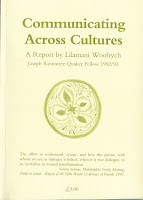When I think of equality in a Quaker context what first comes to my mind is equality between women and men. It is often said that there has always been equality between men and women in the Society of Friends, but this is only a partial truth. While in general there has been spiritual equality, Quakers have often retained the temporal attitudes to the roles of the sexes that have been part of the world in which they lived and live. There are examples of this scattered through the biographies that I am writing as part of the Quaker Alphabet.
Back in the 1980s I was a member of the Quaker Womens Group and helped to write and present the QWG Swarthmore lecture Bringing the Invisible into the Light at Yearly Meeting in Exeter in 1986. The fact that Quakers had sometimes fallen short in their testimony to equality was one of our themes and we encountered a very hostile reaction from some quarters for daring to question an accepted truth.
There are other areas in which Quakers have not always managed, consciously or unconsciously, to be true to their testimony to equality. Friends in Britain have exhibited some racist attitudes as Lilamani Woolrych found when she was a Joseph Rowntree Quaker Fellow in 1993 and published in her report Communicating across cultures.
More recently Vanessa Julye and Donna McDaniel have looked at the record of American Quakers in this area in their 2011 book Fit for Freedom, not for Friendship and found it less than perfect. Although Quakers worked to right the wrongs of African Americans they were uncomfortable about living with them as equals or accepting them as full members of the Society of Friends. Black Friends were expected to take their place on the 'back benches' and had to fight for full acceptance as members.
In the same way lack of equality related to social class or educational differences was and perhaps still is an issue among Friends. When the Adult School movement was at its height among Quakers in the 19th and 20th centuries some of the working-class pupils wanted to be
 |
| An application form for Quaker Associate Membership |
they were not accepting these people as equals.
I feel that it is important for Friends to recognise that we have failed to live up to our testimony to equality in the past and may be failing always to live up to this and other testimonies today. If we do not recognise this we run the risk of falling into the trap of self-righteousness. It is salutary to remember that Quakers are no more perfect than the rest of humanity and never have been.




2 comments:
Thanks Gill, an important topic, and an important reminder to remember our failures. We must keep trying to do better.
Quaker disability equality is improving, but has quite some way to go, too. Generally, not specially within Quakers, it lags behind the others.
Post a Comment